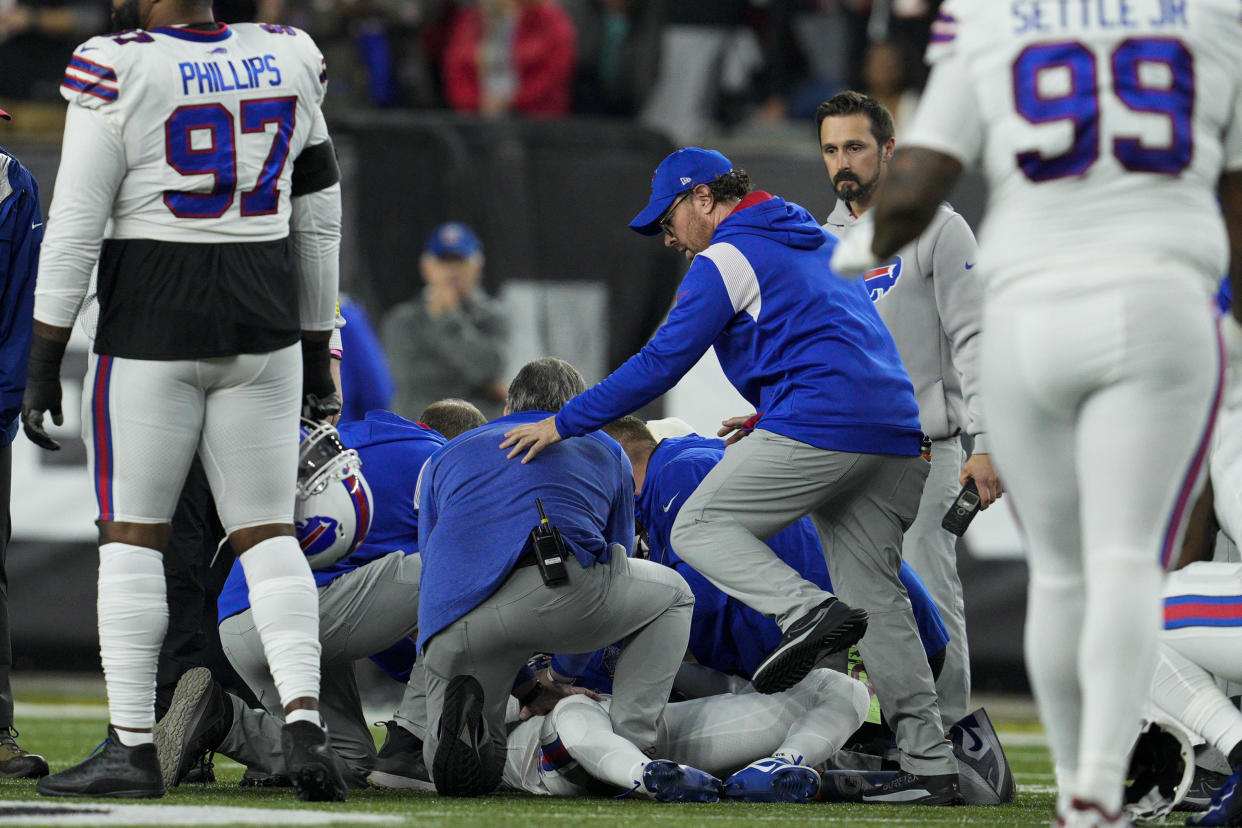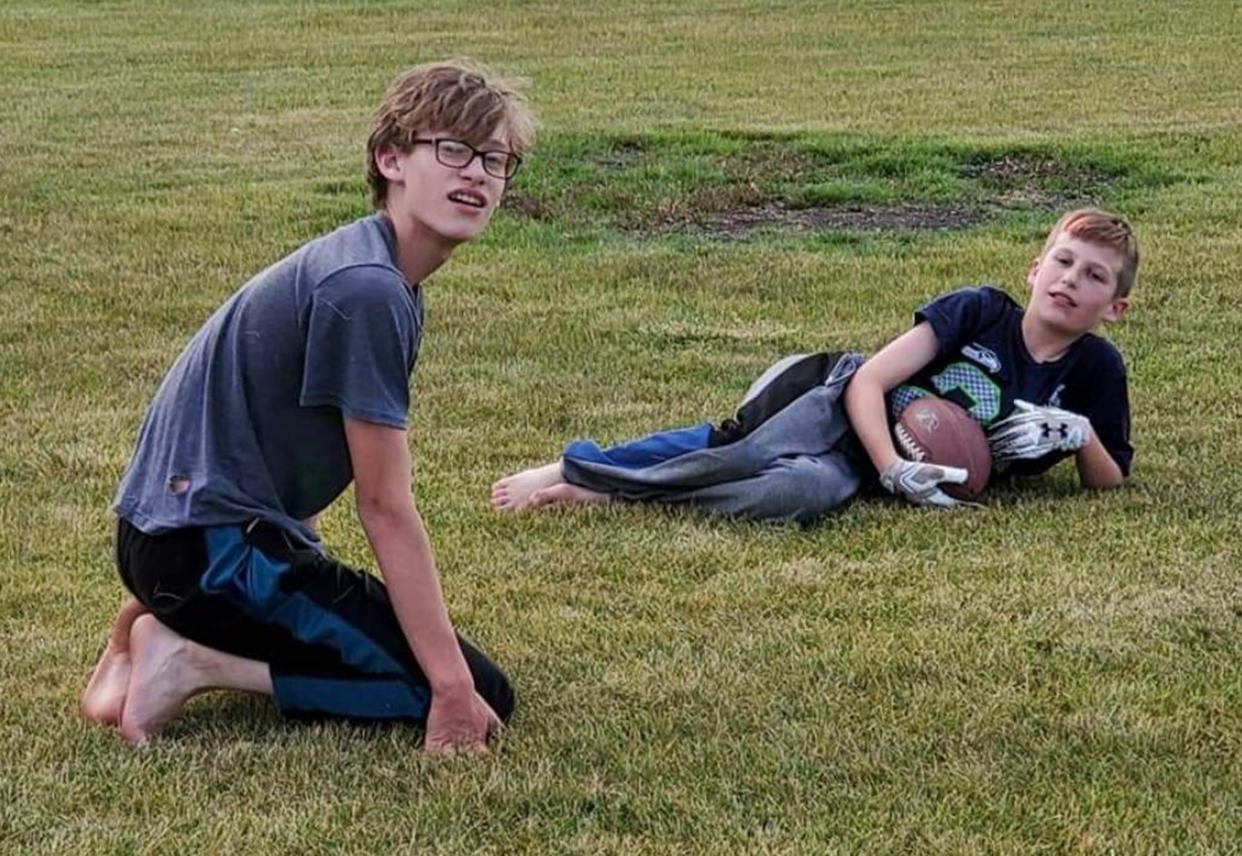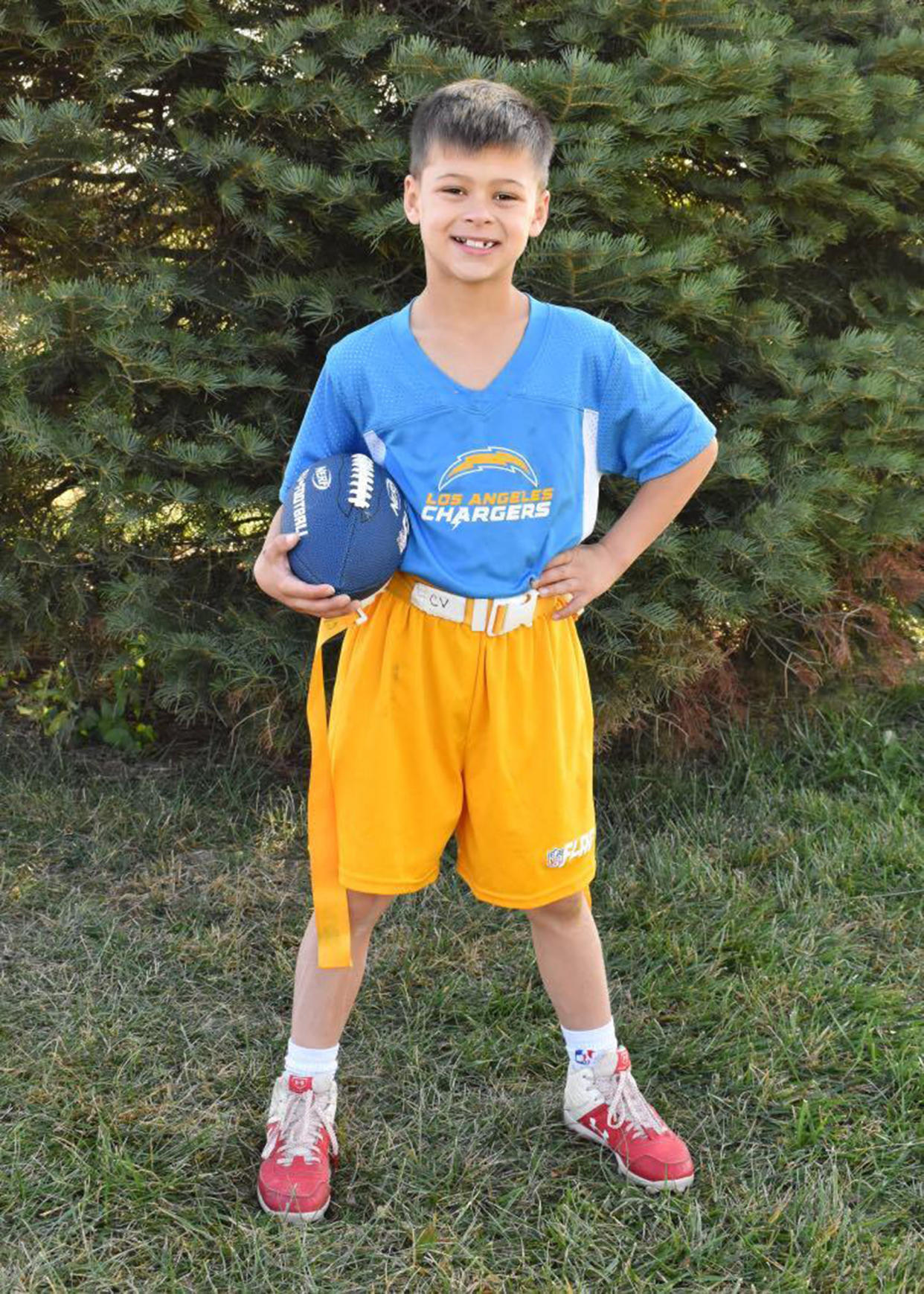Parents are talking, again, about the risks of football after Damar Hamlin’s cardiac arrest
Parents are once again weighing the risks and rewards of letting their children play football, after Buffalo Bills safety Damar Hamlin suffered a cardiac arrest during a Jan. 2 game.
After tackling a Cincinnati Bengals receiver who collided with his chest, Hamlin, 24, stood to his feet before collapsing to the ground. He received CPR on the field for at least 10 minutes, and according to a statement from the Buffalo Bills, Hamlin's "heartbeat was restored" before he was taken to the University of Cincinnati’s Level 1 trauma center.
Currently, Hamlin is sedated and in critical condition, according to the Buffalo Bills. The University of Cincinnati Medical Center has not provided any further updates on his condition; TODAY.com reached out and did not get a response. “We don’t know exactly what happened, (and) we don’t know exactly his health condition prior to this,” Dr. John Torres, NBC News senior medical correspondent, said on TODAY on Jan. 3.
His frightening collapse is reminding parents of the danger in every sport, especially football. For the most part it's concussions, not cardiac arrest, that make parents and doctors worry. Brain injury continues to be the main concern, but Hamlin's health battle is shining a broader spotlight on the difficult decisions parents face about letting their kids play football.

Laura Donovan's husband is a “big football fan,” she says, and played football in high school. But the Oregon mom of two says neither of them would be sad if their sons never want to play.
“I know many sports come with concussion risk, but football seems like the most brutal of the bunch,” Donovan, 34, tells TODAY.com. She says she always hoped that “football would be illegal” by the time her sons, ages 2 and 4, were old enough to play — but that seems unlikely.
If her sons do want to play football, Donovan says, she wouldn't absolutely forbid it.
"I’d present the information about concussion risk and other injuries. I wouldn’t want either kid to rebel, so all I can do is highlight the risk factor," says Donovan, who lives in Oregon. "I really hope neither son wants to play, but I also don’t want to my super negative reaction to be a reason for them to seek football out."
Poll: Parents concerned about football
Concerns about the safety of football are nothing new. One 2018 poll conducted by NBC News and the Wall Street Journal found that 48% of parents said they would would encourage their children to play a different sport.
While Hamlin’s injury has rejuvenated the conversation, Dr. Steven Reisman, a cardiologist and director of the New York Cardiac Diagnostic Center, says cardiac arrest is not the main injury concern.
"The heart is controlled by an electrical rhythm. If you get hit with blunt trauma to the chest at what's called a vulnerable period, that can mess up your rhythm and can cause cardiac arrest," Reisman tells TODAY.com. "Football is a traumatic sport, but a blow to a chest can occur with a baseball hitting you. I don't think this is the biggest problem with football — the more common problems are head and spinal injuries."
A study published in the American Journal for Preventative Medicine in 2022 found that over 6 million children have suffered traumatic brain injuries (TBIs). The same study found that TBIs in girls increased, while the number of injuries in boys decreased, likely the result of "changing attitudes towards concussions in sports, especially football," Dr. Alan Cook, co-author of the study, said.
Casey Andrews, 41, says she would feel relieved if her 6-year-old son stayed away from football, but “ultimately won’t stop him.”
“My initial concern is just with the culture,” Andrews, from Idaho, tells TODAY.com. “My second reservation is with physical impacts of the sport — particularly head injuries.”

Even though what happened to Hamlin is rare, Andrews says his situation "certainly reinforces" her fears.
"I think there's this perception, especially in school-level sports, that everything is safe," she says. "I think that perception is dangerous."
She says she plans to make it "crystal clear" that she thinks youth football is a bad idea. "Luckily," she says, "so far he seems to be a computer science oriented kinda guy, so we’re hoping for chess club.”
Parents who say yes to football
Eric Masker, 39, says he worried about injuries and "the social aspects" when his two oldest sons, ages 16 and 14, wanted to play football. But, he says, he also sees the benefits.
"I also see how much they love to play, how happy it makes them and how it motivates them to excel in other areas of their lives," Masker, a father of four who lives in Alaska, tells TODAY.com, adding that his partner was equally hesitant. "Ultimately we are on the same team, and that is to encourage them to do what they love and help prepare them for or mitigate injury potential."

Recently, Masker's 11-year-old daughter said she wanted to play flag football, and he says he had the same conversation he had with his two oldest sons.
"I start with encouragement and gently asking them why, without implying they shouldn’t be interested," he says. "If we uncover some shallow answers, I try to pose something more to think about, like having teammates that depend on you, receiving criticism from coaches and players, and if it’s something they can see themselves doing for more than a couple of years."
Hannah Murphy, 34, says she loves football and was thrilled when her 9-year-old son wanted to play. But after watching him play tackle football for two years, the Tennessee mom of two says she's starting to grow concerned about the potential for injury due to an "obvious size difference between some of the kids."
"The sport is becoming more competitive and intense every year," Murphy tells TODAY.com. "I worked in clinical healthcare for more than a decade, with that time being divided pretty evenly between sports medicine and emergency departments, so I have seen a lot of bad injuries."
When her son asked for permission to play football, Murphy was candid about the potential risk.
"'Football hurts' were my exact words," she explains. "My decision to let him play basically came down to this: Out of everything I’ve seen in healthcare, just a fraction of those injuries could be attributed to football."
'Let me think about it'
Kyle Vilmont, 35, works in a rehabilitation hospital and, like Murphy, has seen her share of sports-related injuries. So when her 8-year-old son showed an interest in playing football, she hesitated.
"I felt anxious, but also guilty," the mom of two tells TODAY.com. "He is very little, and I worry about any kind of injury. The guilt comes from the fact that I know how much he wants to play, and I don’t want to inhibit him from doing something that he loves to do."

After her son asked to play football for over a year, Vilmont, who lives in Nebraska, agreed to let him play flag football — she says she hopes doing so will help her son understand the fundamentals and "allow him to be more aware of what he’s supposed to be doing and avoid possible injuries."
"In regards to this coming football season, I have developed a catchphrase: 'Let me think about it,'" she adds.
Murphy is in the same boat: She has not decided about her son playing football next season.
"Both my son and I are hesitant," she explains. "He sees now how intense it is and how tough you have to be to make it as a player. My worry is that when the sport becomes too intense, it's no longer fun. I know accidents can happen in any setting, but some are definitely more common in football, and if the game is no longer a joy to play what’s the point in risking injuries?"
Related video:
This article was originally published on TODAY.com
